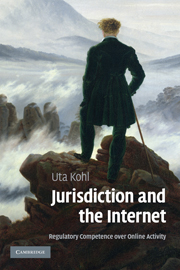Book contents
- Frontmatter
- Contents
- Preface and acknowledgments
- Table of cases
- Table of statutes, regulations, directives and treaties
- 1 Jurisdiction and the Internet
- 2 Law: too lethargic for the online era?
- 3 The tipping point in law
- 4 Many destinations but no map
- 5 The solution: only the country of origin?
- 6 The lack of enforcement power: a curse or a blessing?
- 7 A ‘simple’ choice: more global law or a less global Internet
- Bibliography
- Index
6 - The lack of enforcement power: a curse or a blessing?
Published online by Cambridge University Press: 18 July 2009
- Frontmatter
- Contents
- Preface and acknowledgments
- Table of cases
- Table of statutes, regulations, directives and treaties
- 1 Jurisdiction and the Internet
- 2 Law: too lethargic for the online era?
- 3 The tipping point in law
- 4 Many destinations but no map
- 5 The solution: only the country of origin?
- 6 The lack of enforcement power: a curse or a blessing?
- 7 A ‘simple’ choice: more global law or a less global Internet
- Bibliography
- Index
Summary
Limited enforcement power: a blessing in disguise
If States could enforce all the regulatory claims they assert they have a right in principle to make, the Internet as we know it would not exist. Perhaps we would be left with State-Wide-Webs with the occasional foreign website straying into it. For all but a few multinational companies, it would be far too risky to allow one's site to be accessed outside one's home State. In most European States, there would be no spam, a little controlled pornography, no hate speech sites, no weapons sites, no how-to-build-your-own-nuclear-bomb sites and only the occasional respectable gambling site. There would be few dodgy dealers; scams would be rare; Google would return hundreds instead of millions of results on any search; sites could be approved, and perhaps would be; they would be listed, classified and catalogued in directories. There would be no chaos, but order, not an absolute order but an order like the one we are accustomed to in the real world. Yet, what a dull place it would be. How less rich, informative, convenient and entertaining, how less creative, energetic and dramatic, how less democratic and egalitarian, a place it would be.
Whatever is said below about enforcement, on the need for effective mechanisms, on the shortcomings of current measures in the online world and on possible solutions, comes with a health warning, the warning that a perfectly ordered online world would not be so perfect after all.
- Type
- Chapter
- Information
- Jurisdiction and the InternetRegulatory Competence over Online Activity, pp. 199 - 252Publisher: Cambridge University PressPrint publication year: 2007



